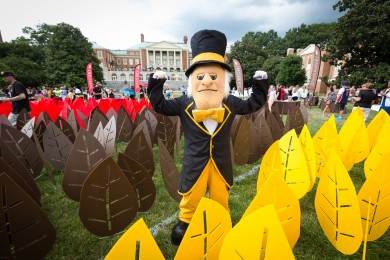Wake Forest launches ‘Thrive’
Frozen yogurt, cute puppies and the opportunity to learn about ways to “Thrive” at Wake Forest drew hundreds from the campus community to Manchester Plaza.
Senior Jalissa Smith said, “I like the holistic aspect of it.”
Today’s campus-wide introduction of “Thrive,” the University’s comprehensive approach to wellbeing, featured fun activities to get people thinking and talking about serious topics such as financial planning, work satisfaction, intellectual engagement and spirituality.
“Wellbeing has many dimensions and goes far beyond physical and emotional health,” said Wake Forest University President Nathan O. Hatch. “Wake Forest aims to transform both our campus and culture by making wellbeing a defining element of the college experience. Just as Wake Forest has become a national model for personal and career development, we are rolling out a comprehensive, holistic approach that will enliven our campus.”
Equal parts education and inspiration, “Thrive” aims to provide the skills, knowledge and perspective to live healthier, balanced lives.
“Students should prioritize wellbeing because it leads to more authentic happiness and because holistic wellbeing helps students flourish in and out of the classroom,” said Kevin Chapman, a junior from Thousand Oaks, Calif., as he stopped at each station and collected the colorful buttons symbolizing each wellbeing dimension.
Follow the leaves
Starting at 3 p.m. on Manchester Plaza, students, faculty and staff explored the many dimensions of wellbeing and found resources to support them. A giant leaf-shaped installation created with hundreds of brightly colored cutouts provided a striking visual prompting the campus community to consider even seemingly small decisions as integral to their overall wellbeing.
“I think that not only awareness campaigns but also efforts to facilitate dialogue on campus are necessary steps to reaching holistic wellness,” said Ade Ilesanmi, a Wake Forest senior. “I’m not sure the majority of students are aware of how many resources they have on this campus — including the Counseling Center, the Chaplain’s Office, peers and even their professors.”
Activities covered eight dimensions of wellbeing: emotional, environmental, financial, intellectual, occupational, physical, social and spiritual.
Standing beside a large painted tree showing student and faculty picks of the “best places on campus to recharge,” Emily Friend, a sophomore from Wilmington, N.C. said of the eight-dimensional approach to well-being, “This speaks to everything I am.”
At the intellectual wellbeing station, students were asked to share their favorite work of literature, art, music or theatre and describe a time when a Wake Forest class, event, professor or mentor inspired them to think differently.
Dozens of green cards with the responses were attached to clotheslines, so others could read them. Then, participants had the option of recording audio versions of their responses in a sound booth set up by radio station WFDD.
Many faculty members visited each station and spent time talking with students.
“From a teaching perspective, ‘Thrive’ is a great framework for advising students,” says chemistry professor Christa Colyer. “Wake Forest is about educating the whole person and that includes talking with students about their dreams and helping them plan a journey that takes into account not just what classes they should take and what to major in, but how these choices will support their overall wellbeing.”
Meena Rezazad, a first-year student from Falls Church, Va., and Alexis Collins from New Canaan, Conn., met in orientation and decided to check out the ‘Thrive’ event together. They were impressed overall.
Rezazad said, “I think it’s pretty cool how the university narrowed down (wellbeing) into different areas so you can see which part you need more help in.”
Collins said the puppies were a draw and thinks the whole concept is a great way to “try and balance our lives out and especially manage stress.”
Other highlights included:
- An “OpportuniTree” encouraging attendees to share ideas about thriving at work;
- A creative community art installation addressing the question, “What are you saving for?”;
- Zumba classes and outdoor games motivating people to get moving; and
- A drumming circle, a meditation room and a labyrinth focusing attention on spiritual wellbeing.
Senior Billy Nicholson of Falmouth, Mass., said he came for the food, which included sweet potatoes with apples and bacon, kale salad with strawberries, and a special Thrive snack mix with granola, cranberries, pecans and oranges. But, Nicholson also said he was pleased about University’s focus on overall wellbeing and has learned a lot from professors and fellow students about “finding balance.”
Campus leaders thought the leaf was an appropriate symbol for “Thrive.”
“We are growing a campus community culture that reflects our extraordinary commitment to the overall wellbeing of our students, faculty, staff and community,” said Provost Rogan Kersh.
Steps forward in wellbeing
Wake Forest is among a growing number of selective universities focused on holistic wellbeing and the essential elements for leading balanced lives. The University has been creating innovative approaches to allow students to unplug, engage, and connect to a deeper meaning and purpose. With new gathering places like Zick’s and fun improvements to public spaces such as an outdoor reading room, game carts and moveable tables and chairs, the University is focused on the goal of relieving stress and increasing overall wellbeing.
Earlier this week, the University announced the hiring of its first director of wellbeing, Malika Roman Isler (’99), who attended the “Thrive” event.
Today, Wake Forest took the first steps in creating a facility that will become a dynamic hub for wellbeing with the groundbreaking for the Sutton Center at historic W.N. Reynolds Gymnasium.
“We intend to create new synergies and help students develop healthy habits and build a sense of resilience that will carry them forward through the ever-unfolding challenges of a rapidly changing world,” said Vice President for Campus Life Penny Rue, who was dressed in a “Thrive” t-shirt.
Categories: Alumni, Campus Life, Enrollment & Financial Aid, Happening at Wake, University Announcements, Wellbeing
Media Contact
Wake Forest News
media@wfu.edu
336.758.5237





